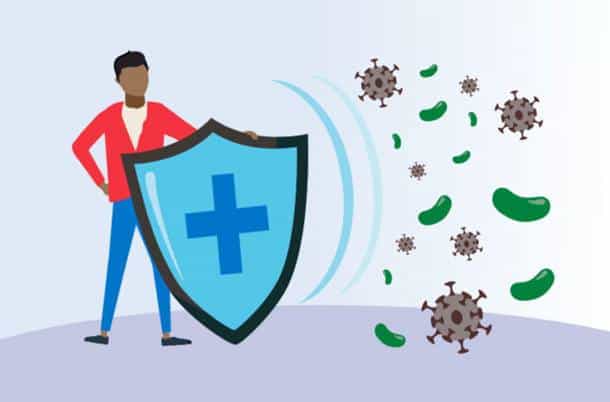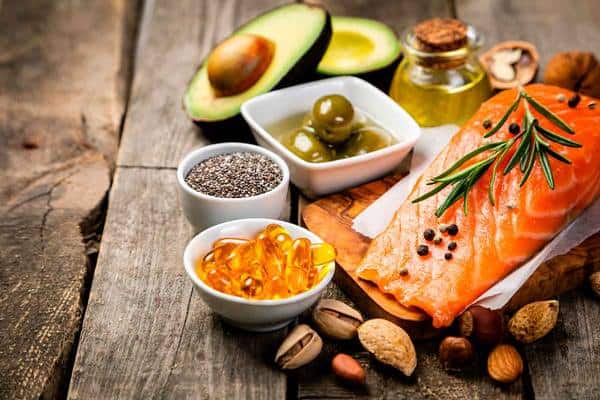Your immunity is so important these days. COVID-19 has made sickness a four-letter word that no one dare speak.
A feeble immune system can leave you vulnerable to not only various illnesses, but also weeks and weeks of unnecessary recovery.
You may not know much about how the immune system works, but it grinds hard every day to keep out more than just the common cold and flu.
What makes up your immune system?

Your immune system is your bodyguard, but instead of guarding the outside, it’s guarding the inside of your body. It protects the body from germs and other pathogens including bacteria, viruses, fungi, and toxins. The immune system consists of a team of several different organs, cells, and proteins.
It features two components that work together: the innate and adaptive or acquired immune systems.
You are born with an innate immune system, but the adaptive is developed when your body is exposed to tiny organisms, for example, bacteria, or when your body is exposed to the chemicals released by those microbes.
When you get sick or are fighting off illness, three crucial vitamins or nutrients boost your immunity: Vitamins D, C, and zinc. These nutrients are important in fighting off infection.
Vitamin D: the body is dependent on this nutrient. It’s involved with every part of your immune system: T-cells, B-cells, phagocytes, and neutrophils. Vitamin D is essential in keeping inflammation regulated. Also, this vitamin minimizes the collateral damage from pathogens, especially viruses. Without Vitamin D, you will suffer from the infection for longer.
Vitamin C is a common vitamin that most people associate with fighting a cold. It enhances the work of white blood cells and increases the ability to defend against infections. Your sickness will again, last longer without this nutrient.
Zinc: without the trace mineral zinc, your thymus gland – the gland that trains your T-cells, shrinks. Zinc is vital to maintain lymphatic tissue, including lymph nodes. It also helps regulate the number of white blood cells in the system. And the duration of illness will be extended without zinc.
The best way to strengthen your system is to include these important nutrients and avoid the foods that deplete your body of them.
10 Foods that weaken your immune system:
1. Sugar
This is one food that causes deficiency in all three of the immune system’s most precious nutrients. It is arguably the number one most damaging food for the immune system.
Research shows that the chemistry of vitamin C is similar to sugar. When both are consumed, the body will favor the sugar. But, this leaves them deficient in one of the most important vitamins. Diabetics or those with blood sugar issues are frequently found to have vitamin C deficiencies.
People who are lacking in vitamin C often suffer from bleeding gums, fatigue, and collagen problems, which can lead to a skin condition called keratosis pilaris.
When you eat sugar, the absorption and activation of vitamin D decrease significantly. Your kidneys can’t process this vitamin as optimally when you eat sugar. Also, experts say sugar stops the production of vitamin D. That’s why diabetics are typically low in Vitamin D.
Also, when you eat and drink loads of sugar, it turns into liver fat, which can then inhibit the absorption of vitamin D.
Zinc absorption also becomes a problem when you consume sugar. It leads to an excessive amount of the mineral being excreted from the kidneys. There’s a name for when there’s too much zinc in the urine – it’s called hyperzincuria. Sugar in the diet also impairs the absorption of zinc.
A 1973 study published in the American Journal of Clinical Nutrition found that it takes about 75 grams of sugar to weaken the immune system. Once the white blood cells are affected, the immune system seems to be compromised for at least five hours after.
So, lay off the sugary juices and pops. The World Health Organization recommends that you get less than 10 percent of your daily calories from added sugar. That works out to about six teaspoons a day.
2. Processed Oils
Canola oil, vegetable oil, safflower oil, soybean oil, and corn oil are all considered refined oils. These processed oils appear to be culprits in inflaming the body. Because of the way they are altered – using chemicals to purify – it leads to the production of trans fats. Trans fats are extremely damaging to the body.
There are many other oils you can use such as olive oil and grapeseed oil that does not have the same negative effect on the immune system. Avocado, goose, duck, and chicken fat are also examples of monounsaturated fats, that can be used to cook at low temperatures under 180 degrees.
3. Saturated Fat

Not all fat is bad for you, but saturated fat is an unhealthy type of fat. Diets high in saturated fat are linked to poor immune response. New research is showing that saturated fats can cause monocytes, a type of white blood cell, to migrate into the tissues of vital organs.
This migration can lead to damage to the intestinal lining. It confirms that high levels of saturated fat in the blood can make a person more prone to inflammation and tissue damage.
Some foods high in saturated fats are whipped cream, fatty meats, processed meats, desserts, cheese, milk, and butter—also, milkshakes, chocolate, and ice cream and good examples of saturated-rich foods.
4. Alcohol
If you’re coming down with a cold, it’s best to say no to a party with drinks on the weekend. Alcohol is a toxin your body has to filter. That compromises your immune system. When your immune system becomes vulnerable, it’s harder to fight off illness or to even recover properly.
Researchers say excessive alcohol intake leads to“slower and less complete recovery from infection and physical trauma, including poor wound healing.”
Alcohol can mess with the body’s gut microbiome or friendly gut bacteria, as well. What seems to happen is that alcohol typically passes through the gastrointestinal tract (GI) and from there is absorbed into the bloodstream.
“One of the most significant immediate effects of alcohol is that it affects the structure and integrity of the GI tract.”So, alcohol will change the number of microbes in the gut flora and that will result in problems with normal gut functioning. The gut function has a direct impact on the health of the immune system.
This all leads to increased inflammation in your body. It should also be noted that drinking alcohol often leads to bad choices like greasy foods late at night.
5. Charred Meats

This typically means any meats cooked over a high temperature, often on a grill with charcoal. The compound called advanced glycation end products (AGEs) produced by charred meats has been shown to raise oxidative stress.
Oxidative stress is an imbalance between free radicals and antioxidants in your body. A charbroiled steak from the barbecue may contain AGEs, which are associated with damaged immune systems and colon cancer.
A study, published in 2018, found that participants who ate well-done or charred red meat and chicken “showed a significantly increased risk of type 2 diabetes compared with those who ate meat and chicken that were lightly browned.”
Researchers are not sure why charred meat has this effect on the body. However, they believe some of the problems lie with the harmful chemicals produced from nitrates added to meats as a preservative. These nitrates form during high-heat cooking. Scientists say these chemicals may ignite an inflammatory response, interfere with insulin production, or promote insulin resistance resulting in the body not being able to balance its blood sugar levels properly.
The aim, then, is to avoid eating frequent meals of grilled chicken, fried bacon, and broiled hot dogs – all of which are full of AGEs. They are also full of saturated fats, another blow to a healthy immune system.
6. Processed Food

Processed grains or carbohydrates, like pizza, weaken your immune system. The Department of Agriculture describes processed food as “any raw agricultural commodities that have been washed, cleaned, milled, cut, chopped, heated, pasteurized, blanched, cooked, canned, frozen, dried, dehydrated, mixed or packaged — anything is done to them that alters their natural state.” That can also include adding preservatives, flavors, nutrients, and other food additives.
You can guess from that description just how many foods are part of the processed food list.
The problem is all the added sugar, salt and artificial colors, and flavorings that can turn a healthy item into a nutritional block. Refined carbs can turn into sugar, which can also affect your gut bacteria, hurt the intestines and spark inflammation, possibly even chronic inflammation. That all results in impeding the immune system.
It’s best to avoid foods like bread, pasta, crackers, and even whole-grain snacks. Other processed junk foods include french fries, hamburgers, and hot dogs. Many of these foods have preservatives that help their shelf life and help them look more appealing.
7. Fried Foods
A three-year study found that about one in three Americans eats junk food daily. When foods go through the frying process, it changes the nutritional makeup of foods through “oxidation, polymerization, and hydrogenation.
”Burgers and fries, to pick out just a few examples, are full of AGEs, hurting your body’s immune balance. Foods like these are loaded with fat and protein and are usually full of AGEs that get worse during cooking. They are also low on the nutrient scale, lacking the vitamins that are so necessary for a strong immune system.
These compounds interrupt your cell production and trigger inflammation. AGEs are linked to degenerative diseases such as diabetes, atherosclerosis, chronic kidney disease, and Alzheimer’s disease.
A good way to offset the negative effects of fried foods is to add healthy salads and vegetables to your meals.
8. Omega 6 Fatty Foods

Omega-6 fatty acids are a type of polyunsaturated fat common in vegetable oils, nuts, and seeds. If you eat them in moderation and place of saturated fats, omega-6 fatty acids can be heart-healthy and even guard against heart disease.
The four types of omega-6 fats include LA (Linoleic acid), ARA (Arachidonic Acid), GLA (Gamma linoleic), and CLA (Conjugated linoleic acid). Poultry, nuts, vegetable oil, grains, canola, and soybean oil are all foods that are full of omega-6.
The issue is when you consume too much Omega 6, it will increase your inflammation. On the other hand, Omega 3 will decrease your inflammation. In North America, the diet is rich in Omega 6 and low in Omega 3. The trick is to create a balance in the body by eating more Omega 3 foods like fish oil, eggs, cod liver oil, and fish.
9. Salt
Too much salt in your diet can slow down your immune response and lead to inflammation in the body. More inflammation can mean trouble down the road with autoimmune disease becoming a real possibility.
A 2020 study published in the journal Science Translational Medicine found that a high-salt diet is not only bad for one’s blood pressure, but also the immune system. “Mice fed a high-salt diet were found to suffer from much more severe bacterial infections. Human volunteers who consumed an additional six grams of salt per day also showed pronounced immune deficiencies.”
Too much salt in your diet makes you more vulnerable to inflammation and thus, disease. It also affects the state of your gut bacteria. It’s recommended that adults eat six grams of salt a day or less – that’s about one teaspoon.
10. Artificial sweeteners
You are trying to avoid sugar, great. So, your reaching for a substitute is not so great.
There’s some research showing that substituting sugar changes the gut microbiome. One study says that using sweeteners “drives the development of glucose intolerance through induction of compositional and functional alterations to the intestinal microbiota.
” Also, those changes in gut bacteria can then lead to increased inflammation. Thus, your immune response is delayed. It appears that frequent use of fake sugar can turn into chronic inflammation in the body, which can result in the development of autoimmune diseases.
Research is ongoing and often conflicting on this subject, but it would be good to limit the amount of artificial sweetener you eat or drink every day.
Conclusion:
Some foods can block your body’s immune system and make it hard for you to fight off sickness and disease. Stress is not on this food list, but it behaves like a huge hammer on the immune system. Cortisol weakens your immunity, so take a deep breath and relax.
